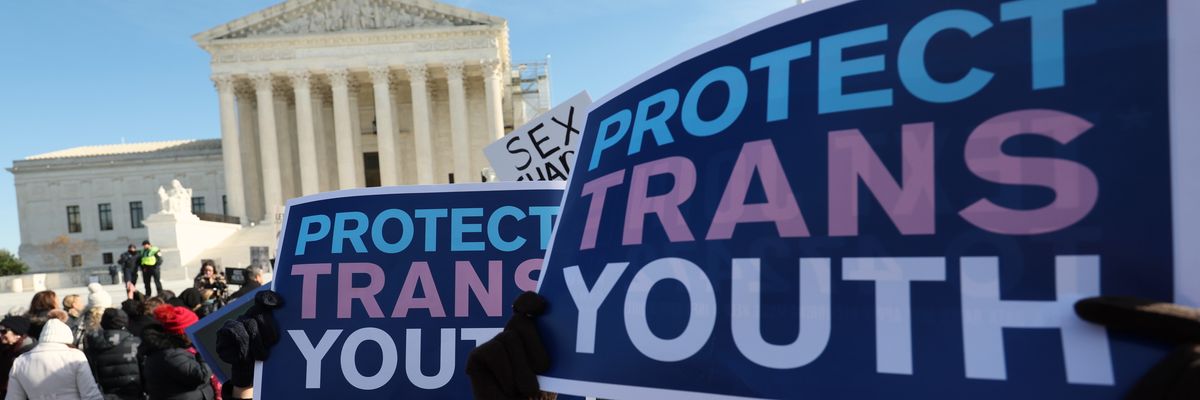In a decision that was partially underpinned by the U.S. Supreme Court's overturning of a 40-year-old legal precedent last year, a federal judge in Kentucky on Thursday struck down President Joe Biden's expanded protections for transgender youths and other vulnerable students, saying the administration overstepped in introducing the rules.
Chief Judge Danny C. Reeves of the Eastern District of Kentucky ruled that the Education Department did not have the authority to expand the protections provided by Title IX of the Civil Rights Act, which since 1972 has prohibited sex discrimination at schools that receive federal funding.
The ruling applies to the new definition in Title IX that was proposed by the department last April, which prohibited "discrimination on the basis of sex stereotypes, sex-related characteristics (including intersex traits), pregnancy or related conditions, sexual orientation, and gender identity."
Right-wing activists and politicians objected in particular to the protections for gender identity.
The rules stopped short of requiring schools to allow transgender students to play on sports teams that correspond with their gender identity—a key fixation of the far right—but required schools and staffers to accept students' identities on a daily basis, for example by calling them by their preferred pronouns rather than according to their sex assigned at birth.
The rules have been blocked in 26 states as Republican leaders in Tennessee, Kentucky, Ohio, Indiana, and other states have filed legal challenges.
In his ruling, Reeves, who was appointed by former President George W. Bush, wrote that "the entire point of Title IX is to prevent discrimination based on sex."
"Throwing gender identity into the mix eviscerates the statute and renders it largely meaningless," he said.
Reeves wrote that "the final rule and its corresponding regulations exceed the department's authority," citing Loper Bright Enterprises v. Raimondo, the Supreme Court case in which the court's right-wing majority overturned the so-called Chevron doctrine. The legal precedent held that judges should defer to federal agencies' reasonable interpretation of a law if Congress has not specifically addressed the issue at hand.
The judge also rejected the Education Department's position that protections for transgender people against workplace discrimination—which were established in 2020 in the Supreme Court case Bostock v. Clayton County, Georgia—should also apply in schools that receive federal funding.
At Law Dork, journalist Chris Geidner wrote that Reeves rejected "Bostock's application to Title IX and [cited] his newfound authority in the wake of the U.S. Supreme Court's decision in Loper Bright Enterprises v. Raimondo to determine 'the statute's single, best meaning' himself."
"As such, he took that authority to decide what Title IX means, the department's view notwithstanding, and set aside the rule," wrote Geidner.
Reeves also wrote that requiring teachers and schools to use students' preferred pronouns and names "offends the First Amendment" and violates the free speech rights of teachers.
That assertion, said Jennifer Berkshire, author of The Education Wars, "really shows you how fake the rhetoric of 'parents rights' is."
"The idea that using a student's preferred pronouns is in any way an imposition on teachers is patently absurd," added Jonathan Cohn of Progressive Massachusetts. "If you can handle using nicknames, you can handle correct pronouns."
Fatima Goss Graves, president and CEO of the National Women's Law Center, said the judge turned "longstanding legal precedent on its head in a direct, disproportionate attack on trans students," and noted that the harm caused by the ruling will extend beyond transgender students.
"Today's decision displays extraordinary disregard for students who are most vulnerable to discrimination and are in the most need for federal protections under the Title IX rule," said Goss Graves. "The Biden administration's Title IX rule is essential to ensure that all students—including survivors of sexual assault and harassment, pregnant and parenting students, and LGBTQI+ students—are able to learn in a safe and welcoming environment. With these protections already removed in some states, students who experience sexual assault have had their complaints dismissed, or worse, been punished by their schools after reporting; pregnant students have been unfairly penalized for taking time off to give birth to a child; and LGBTQI+ students have faced vicious bullying and harassment just for being who they are."
Melanie Willingham-Jaggers, executive director of the LGBTQ rights group GLSEN, told The New York Times that the ruling "shows a stunning indifference to marginalized youth facing harassment and discrimination, as well as hardworking school administrators and principals who are working to build safer learning environments for their increasingly diverse student populations."




